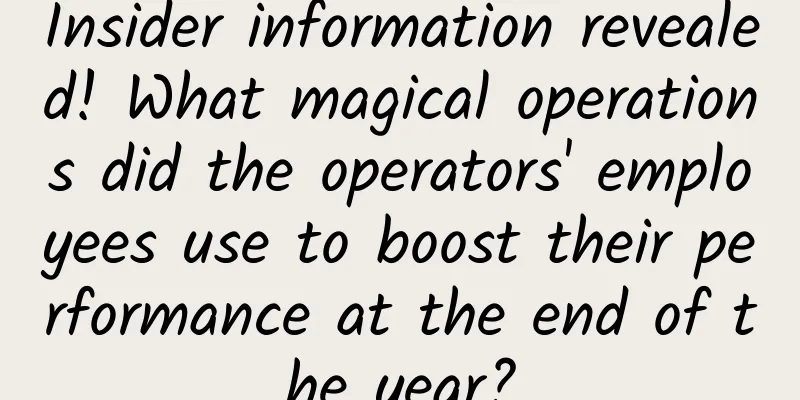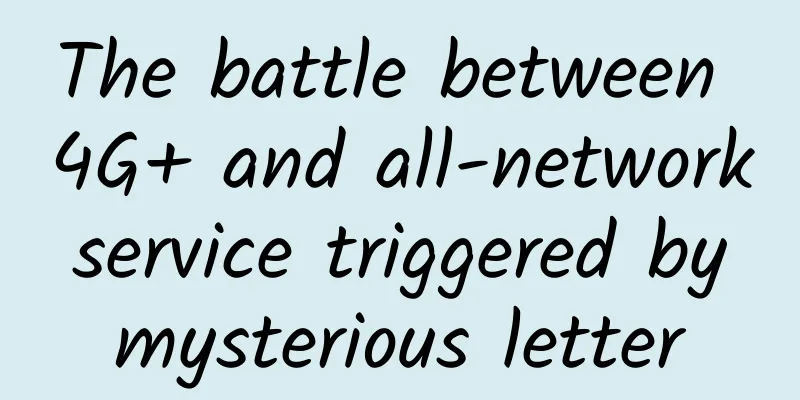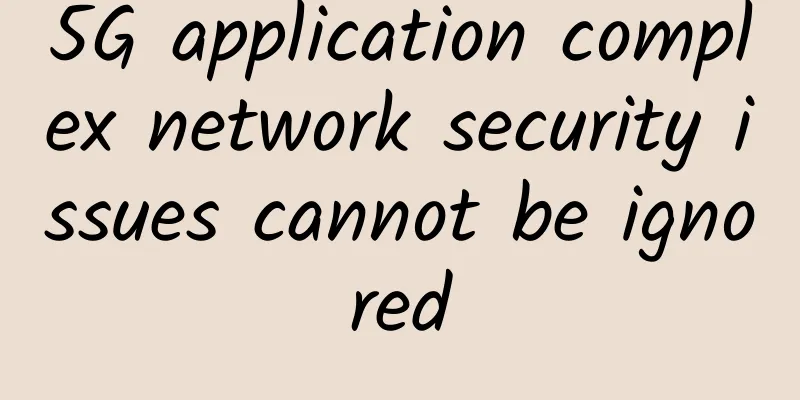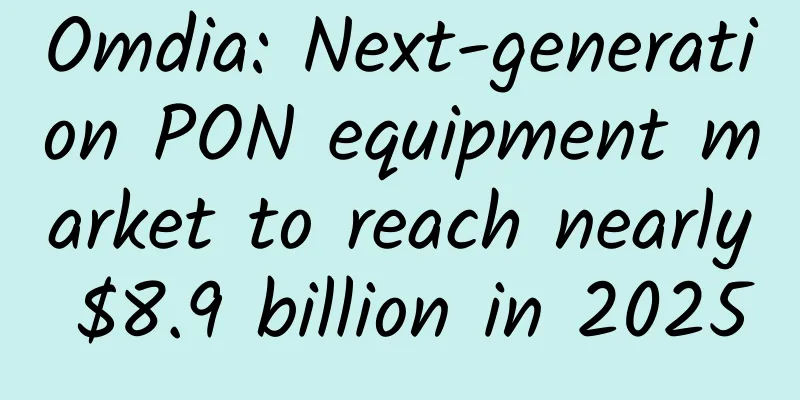Insider information revealed! What magical operations did the operators' employees use to boost their performance at the end of the year?

|
According to the data of "Economic Operation of the Communications Industry from January to November 2020" released by the Ministry of Industry and Information Technology, from January to November this year, my country's telecommunications business revenue totaled 1,245.1 billion yuan, a year-on-year increase of 3.5%, and the growth rate increased by 0.2 percentage points from January to October. So far, the cumulative revenue growth in the first 11 months of this year has not only set a new annual high, but the revenue growth in November has also returned to the level of the first half of the year. While congratulating the communications industry for such achievements, here we also discuss with you the possible operations to rush performance at the end of the year. 1. Falsely increase business before the New Year and then write off the outstanding fees after the New Year Making good use of the annual cycle of KPI assessment has long been known by operators as the best way to boost performance at the end of the year. Although those who formulate KPI assessments are constantly adjusting the various calibers of assessments, such as extending the statistical cycle of assessment calibers, etc., the devil is always one step ahead of the saint, and grassroots comrades will also adjust various operations in a targeted manner according to the changes in assessment calibers. In previous years, the superiors evaluated the number of dedicated lines. Because the evaluation number indicators were not realistic or the market did not agree with the service capabilities, the grassroots employees had to use various management gaps or loopholes to achieve the evaluation targets, such as installing a dedicated line in each hotel room. In fact, everyone at the grassroots knew that this operation was illegal, but they could do nothing about it. The various services that are inflated do not actually mean that they are truly installed, nor do they generate any real income. In many cases, they are just service activation and billing operations in the EMOS system and BOSS system. Although this method will inevitably result in various arrears, the operators themselves will also write off the arrears after the assessment is completed, and then delete the services in the system. Many readers will certainly have questions, that is, there are too many inflated businesses, what should we do if we cannot complete the income assessment? This question actually involves the need for a third-party company to participate in the turnover operation. The third-party company will provide funds to help the operator pass the income assessment. This kind of gameplay is generally called "stock pressure" at the grassroots level, although this kind of gameplay is common in all walks of life. 2. Advertising fees are more useful than marketing promotion According to legal regulations and production and operation needs, operators budget large amounts of advertising expenses every year. A considerable portion of these expenses are used for normal advertising and marketing, but a considerable portion is withdrawn through signing false advertising contracts and used for other purposes, such as using the withdrawn advertising fees to offset user arrears, purchase various marketing items, etc. Everyone knows that the practice of extracting advertising fees by signing false contracts is a serious violation of regulations and even has the risk of breaking the law, but this practice is indeed very common at the grassroots level, especially in county-level and prefecture-level companies. The reason is very simple, that is, under the centralized management model of the entire group, the grassroots have no financial power, but the grassroots still need to deal with society and deal with various difficult problems. Although operators conduct multiple rounds of internal inspections and even special audits on the use of advertising fees every year, the grassroots have already completed the seamless replacement. In addition, internal inspections are often suspected of being a formality. After all, everyone is just completing the assessment tasks above and does not really use the withdrawn funds for personal consumption. Therefore, it is normal to turn a blind eye to the inspection. Even with various inspections, it is difficult to fully verify the actual arrival and use of all paper promotional materials. After all, these consumables have a lot of room for manipulation. Moreover, many paper promotional materials are delivered directly to the marketing front line, without any actual operation of entering and leaving the warehouse. Although this saves a lot of intermediate links and costs, it also leaves room for various advertising fees to be embezzled. 3. Various crazy incentive operations under the pretext of eating up the food for the next year Although the three major operators are different companies, their management models are similar. The constant exchange of senior management cadres will inevitably lead to the convergence of various management. Under the heavy pressure of KPI assessment by superiors, the grassroots will naturally use various operations to achieve KPI. Among these various operations that impact PKI, crazy incentive policies are naturally indispensable, especially in the fourth quarter. A big reward will always attract a brave man, and the managers of operators will naturally use it to the fullest. Whether it is to increase the number release fee, increase the agency fee for developing dedicated lines, or increase the piece-rate salary of employees, as long as it can help complete the number of various businesses, then this operation will appear in the general manager's office meeting of the prefecture-level company. Leaders at all levels know that high investment is to urge employees to spend money to buy performance. Urge employees to spend money to buy quotas? What does this mean? In the case of a very limited incremental market, it has long been difficult to obtain real users. Only by giving users high subsidies can real users be obtained. However, the market subsidies of operators themselves are strictly limited, so they can only extend the subsidy issuance period or use part of the labor costs for market development. In some prefecture-level companies, there is no distinction between the front desk and the back office. Market development targets are issued to all employees, and employees in finance and party affairs are asked to develop users. They are also given various high-end names, such as co-creation of finance and business brands, etc. In fact, part of the salary of the back-end staff is used for development targets. Everyone knows the classic operation of using union funds. 4. So-called “business exchange” with the help of partners There are too many companies that rely on the telecommunications industry to make a living. Naturally, these companies will also participate in the operators' various performance-boosting operations. For example, they require third-party companies to purchase a large number of operators' number cards, broadband, and even recharge cards in the form of so-called "business swaps." As for how these third-party companies will eventually digest these, that is not something the operators need to consider. The purchasing department, network maintenance department, and engineering construction department of operators all manage a large number of third-party companies. How to tap into the business consumption capacity of third-party companies depends on the ability of the relevant department heads. Whether it is an intentional and clear requirement or a hint that it is best to do so, everyone knows it. Although there are too many frustrations in this, everyone still accepts it. The third-party companies of operators also have the demand for communication consumption. No matter whose services they use, this demand exists objectively. The problem here is that the third-party companies cannot consume all the excessive services themselves. Whether they like it or not, third-party companies will become the sales extension of operators, especially those units that cannot consume the excessive services themselves. Although the mutual assistance of operators is somewhat forced, at least it has not harmed the interests of the operators' own employees. As for whether it will harm the interests of third-party companies or third-party employees, how likely it is, you can use your imagination. To put it in a popular phrase, this means eating together and bearing difficulties together. The magic operations discussed above may be happening around you, or they may be biased or outdated. These possible operations are not given here to say that everyone is using crooked methods, but to say that these methods have existed or are happening around you. We don't want you to use such extreme methods to develop your business and meet your targets, but in order to meet various targets, you really can't help but use your brain. |
<<: Are the price increases for mobile phones and broadband services caused by 5G construction?
>>: Report: 5G conspiracy theories caused 170,000 hours of downtime in UK base stations
Recommend
Essential for operation and maintenance: 20 common service ports and their corresponding service information
In the operation and maintenance process, it is c...
Finding strength in numbers: Data center agglomeration effect
In the past, data centers were often built in rem...
10 Ways to Improve Your Home WiFi
Guo Shenghua, the godfather of Chinese hackers an...
Transforming the digital experience with 5G
Transforming digital experiences, products, servi...
F5: Now is the time for digital transformation
On February 1, 2018, the annual core media commun...
To promote the migration of 2G/3G to NB-IoT/Cat1, the Ministry of Industry and Information Technology released the first important document on the Internet of Things in 2020!
Yesterday, the General Office of the Ministry of ...
Communication styles in microservices architecture
In a microservices architecture, communication is...
AT&T and Microsoft team up for private 5G edge deployment
To further accelerate its goal of deploying priva...
Several major trends in the future of LPWAN: large connections, complementary technologies, and everyone being an operator
Although LPWAN has a history of several decades, ...
7 New Year's Resolutions for the Internet of Things
The beginning of a new year is often a time for p...
Ethernet Alliance Chairman: Flexible Ethernet is the key direction for future network development
In the past, when people mentioned Ethernet, the ...
Aruba Launches ArubaESP, the Industry’s First Cloud-Native Platform for the Intelligent Edge
Aruba, a Hewlett Packard Enterprise company, today...
How can enterprises ensure that SDN deployment is effective?
[[177483]] In recent years, companies ranging fro...
Misaka: $44/year KVM-2GB/32G NVMe/2TB/Germany (optional CN2)
Misaka is a Chinese merchant (the same company as...









